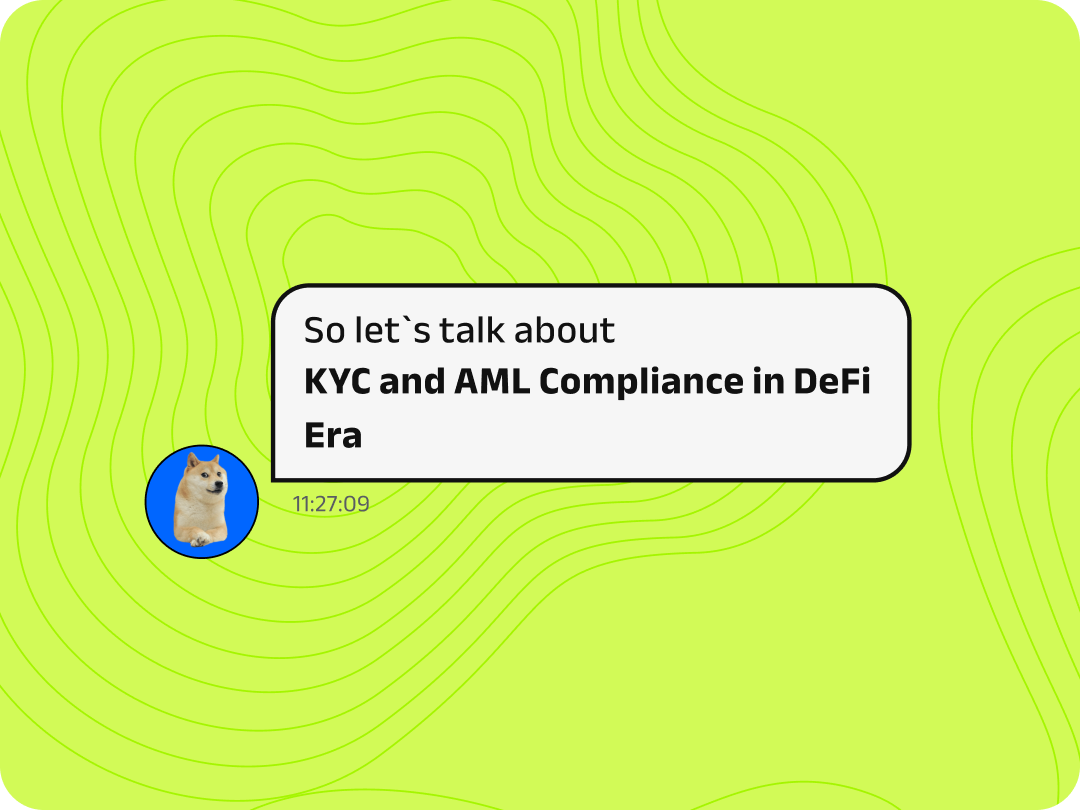In recent years the financial industry was refashioned by the rising of DeFi. It introduced a new era of financial services based on blockchain technologies and smart contracts that are transparent, decentralized, and accessible for everyone and everywhere. On the other hand, DeFi also brought up new compliance obstacles such as KYC and AML regulations.
This article briefly overviews Know-Your-Customer and Anti-Money-Laundering compliance in the DeFi era, challenges faced in achieving compliance balance, and best practices with KYC and AML compliance benefits in the Decentralized Finance area.
Identity Verification in DeFi
The DeFi ecosystem has gained immense attention worldwide and has grown significantly in the past few years. The value of assets in the DeFi system raised to $180 billion in December 2022, according to Azeem Azhar.
Therefore, regulators worldwide show concerns about the main benefits of DeFi now – the anonymity of users and its decentralized nature. Since these two features give fraudsters an endless field of activity, the implementation of identity verification will be the first logical step to protect the DeFi business. The tendency of regulators worldwide is to figure out the best AML regulations for the “new” DeFi era.
As regulators in the U.S. continue to tighten their grip on the cryptocurrency industry, other countries are taking a more friendly approach toward decentralized finance (DeFi) regulations. The regulatory body that oversees French financial markets, the Autorité des Marchés Financiers (AMF), recently published a discussion paper that provides a definition of what constitutes DeFi and outlines the sector's trends and risks. With increasing pressure from U.S. regulators, legislators in Europe and Asia are seeking to attract the growing DeFi industry to their shores with clearer and more favorable regulations.
Identity verification is the central element of KYC and AML compliance. It covers verifying applicants’ identity through various means, such as ID documents, biometric data, tax numbers, and other only personally identifiable information. It helps to prevent fraud and ensures that the financial services provided are used for legitimate purposes only.
However, the decentralized nature of DeFi contradicts the identity verification implementation in its ecosystem. Decentralization means there is no central authority to verify identities, and DeFi protocols differ in requirements for the identity check. As a result, implementing one standardized identity verification process is a real challenge in the DeFi system nowadays.
Achieving Compliance Balance

Achieving the balance between compliance with needed regulations and yet maintaining the decentralized and accessible nature of DeFi is one of the most significant challenges faced in KYC and AML compliance in the DeFi era. It requires finding a way to ensure the accessibility of financial services while also preventing them from being abused for illicit activities.
Another obstacle is the lack of clarity and consistency in KYC and AML regulations across various jurisdictions. Since DeFi protocols operate across borders, compliance rules can vary significantly among different territories. This creates compliance difficulties for DeFi startups that need to comply with multiple sets of laws, which is usually costly and time-consuming.
Best Practices for KYC and AML Compliance in DeFi
To ensure KYC and AML compliance in DeFi, businesses, and organizations need to implement the best methods that balance compliance requirements with the need for decentralization and accessibility. One such practice is to implement a risk-based approach to compliance, which involves assessing the level of risk associated with each customer and tailoring the compliance measures accordingly.
Another drill is to leverage the best-fitted technology to automate compliance processes, such as identity verification and transaction monitoring. This can help to reduce compliance hardships and ensure that compliance measures are applied consistently across the business processes.
The Role of Customer Data Privacy in KYC and AML Compliance
Another important element of KYC & AML compliance is customer data privacy. Service providers need to ensure that they collect and use customer data in accordance with applicable privacy laws and regulations. This includes obtaining customer consent for the collection and use of their data, implementing appropriate data security efforts, and ensuring that customer data is only used for the purposes for which it was collected.
In DeFi, customer data privacy can be challenging to achieve due to the decentralized nature and desire for anonymity by most clients. Businesses need to ensure that customer data is kept private and secure while complying with regulations that already exist and encouraging the client to share this sensitive data with them.
Summarizing the benefits of KYC and AML Compliance in DeFi
1) It helps to ensure that DeFi remains a trusted and secure financial ecosystem, which can attract more investment and adoption.
2) It also helps to prevent DeFi from being used for fraudulent activities, which can protect investors and customers from financial losses.
3) For long-term success is essential to build between businesses and their customers that AML and KYC compliance solutions can also help with.
KYC and AML Compliance Solutions from KYCAID for DeFi businesses
KYCAID is a leading provider of KYC and AML compliance solutions for DeFi businesses. KYCAID offers a range of compliance services, including identity verification and transaction monitoring. Our solutions are designed to help organizations to achieve compliance balance while also maintaining the decentralized and accessible nature of DeFi.
KYCAID's solutions are powered by cutting-edge technology, such as machine learning and artificial intelligence, which can help to automate compliance processes and reduce the compliance burden. Its solutions are also customizable, allowing startups to tailor their compliance measures to their specific needs and requirements.

KYCAID Solutions for DeFi businesses
Learn more about use cases and products from KYCAID that cover all compliance needs for your business.
KYC and AML compliance are critical elements of the DeFi ecosystem. Compliance helps ensure that DeFi remains a trusted and secure financial ecosystem accessible to everyone. Achieving compliance balance can be challenging, but startups can implement best practices and leverage technology to ensure compliance while maintaining the decentralized and accessible nature of DeFi. KYCAID offers a range of compliance solutions for DeFi businesses, which can help to reduce the compliance burden and ensure that Defi organizations can focus on innovation and growth.
Reach KYCAID by [email protected] or sign up on the website.
